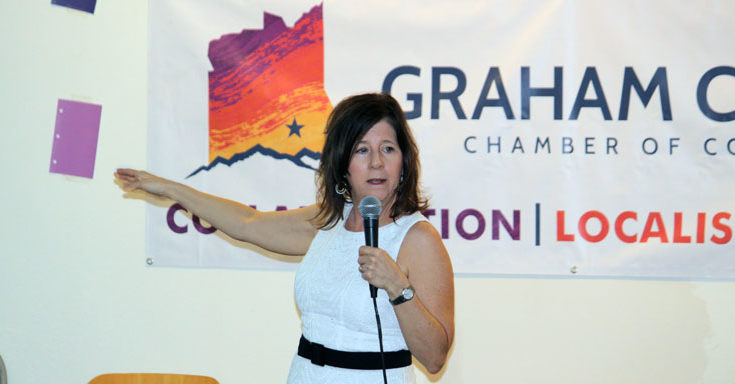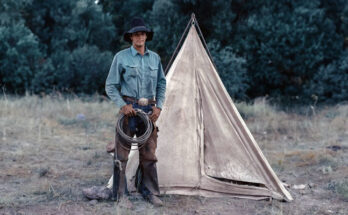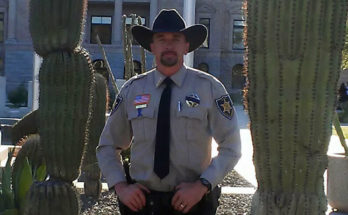Jon Johnson File Photo/Gila Herald: Kimber Lanning of Local First Arizona, extols the virtues of doing business locally at a previous event.
Additional grant funding enables local businesses across the region to participate in the innovative program
Contributed Article
Safford –More local businesses than ever can now participate in a micro-loan program from Local First Arizona Foundation and the Freeport-McMoRan Foundation thanks to additional grant funding of $50,000 from the Greenlee County Community Investment Fund as well as an added $30,000 from the Graham County Community Investment Fund.
In addition, the city of Safford has contributed $100,000 to help support businesses in Safford. City Manager, Horatio Skeete, said the program so far has demonstrated “remarkable returns for economic development in our community.” Citing that the program has loaned out $95,000 and can track five new jobs created so far, with more potentially to come.
This additional funding will enable more local businesses in Southeastern Arizona to seek much-needed loans in smaller amounts and at reasonable interest rates.
“Added grant dollars from Community Investment Funds, in both Graham and Greenlee counties, directly relate to a priority need that community members have been vocal about for some time: economic diversification,” said Tracy Bame, Director-Social Responsibility and Community Development and President of the Freeport-McMoRan Foundation. “Expanding the Micro-loan program provides immediate resources to support growth of existing enterprises as well as the enhanced skills and opportunities individuals need to reach their full potential and play a progressively active role in the prosperity of their own communities.”
The Micro-loan Program was launched in Graham County in 2018 through a partnership between Freeport-McMoRan Foundation and Local First Arizona Foundation, with additional support provided by Vitalyst Health Foundation and Community Investment Corporation. The goal of the program is to invest in existing local businesses, encourage start-up businesses, and demonstrate the need for increased rural lending. Since the program began, $120,000 in micro-loans have been deployed to small, local businesses in Graham County, which has increased their capacity to create new jobs.
Kevin Ticer, owner of Custom Upholstery Services, was making small repairs and upgrades when he could afford to, but with the micro-loan for his business, he was able to accelerate his expansion.
“It was easy to go through the micro-loan process. After a couple of meetings with the loan committee, I was approved and able to invest in equipment and remodeling that I needed – painting, electrical, lighting – I’ve hired a new employee, too,” Ticer said. “My building has a long way to go, but it really helped push my business forward. We’re moving in the right direction.”
The loan fund processing is managed by the Community Investment Corporation, which secures loan documents and collateralization as needed. Applications are reviewed by a committee of community members:
Representing Graham County: Armando Carrillo, One AZ Credit Union, Vaughn Grant, Country Financial, Ashley Arrellin, Washington Federal, Casey Clayton, Freeport-McMoRan, Devin Gillespie, One AZ Credit Union
Representing Greenlee County: Marcia Onda, Freeport-McMoRan, Valerie Smith, Duncan Town Council
“The great thing about the committee is that we are made up of business professionals and financial branch managers who understand the impact that a micro-loan has on a business and on our communities,” said Armando Carrillo, Micro-loan Program Committee Member. “We get to know the owner, like Alex Martinez of A&K Painting – in business for 20 years – who was able to buy new equipment and expand from being a paint shop to branch into custom cabinetry, too.”
Carrillo said as a One AZ Credit Union branch manager, he’s been successful in giving loans to businesses, but was missing some that couldn’t put together the required robust history. Now, he can steer these potential candidates to apply for a micro-loan instead of missing out on funding altogether.
The Committee created the following criteria for establishing the viability of a loan:
– Will it drive economic growth in the local community?
– Will it retain workers in the local community?
– Will it grow the workforce or create new jobs in the local community?
– Will it follow local ordinances, zoning, federal and state laws?
– Is there a real need/desire for the concept in the community or is it duplicative?
Kimber Lanning, Founder of Local First Arizona Foundation, said the launch in Graham County helped address the lack of local decision-making when it comes to business lending.
“Loans are underwritten and reviewed in the home state of the banks that have branches in Graham County,” Lanning said. This means local branches will not have the flexibility to lend in the $25,000 and under range because smaller loan sizes are less profitable. But through the Micro-loan Program, “the community is coming together to find innovative solutions for local businesses to receive capital.”
Community Investment Corporation (CIC), from Pima County, manages the loan servicing and any collateralization needed. CIC is committed to improving access to capital in Arizona’s southern rural communities.
Businesses in Graham and Greenlee County can apply to the Micro-loan Program by visiting www.azmicroloans.com.
About Local First Arizona Foundation
Local First Arizona Foundation works to strengthen local economies and build opportunities for all Arizonans to create an economy that is sustainable, resilient and celebratory of diverse cultures. LFAF focuses on a wide range of strategic initiatives that target systems of inequity. These initiatives include powering Arizona’s entrepreneurs through the Fuerza Local Business Accelerator Program, celebrating Arizona’s homegrown foods through the Healthy Local Foods Initiatives, and strengthening Arizona’s small-town economies through the Arizona Rural Development Council and other rural programming. Find more information at localfirstazfoundation.org.








